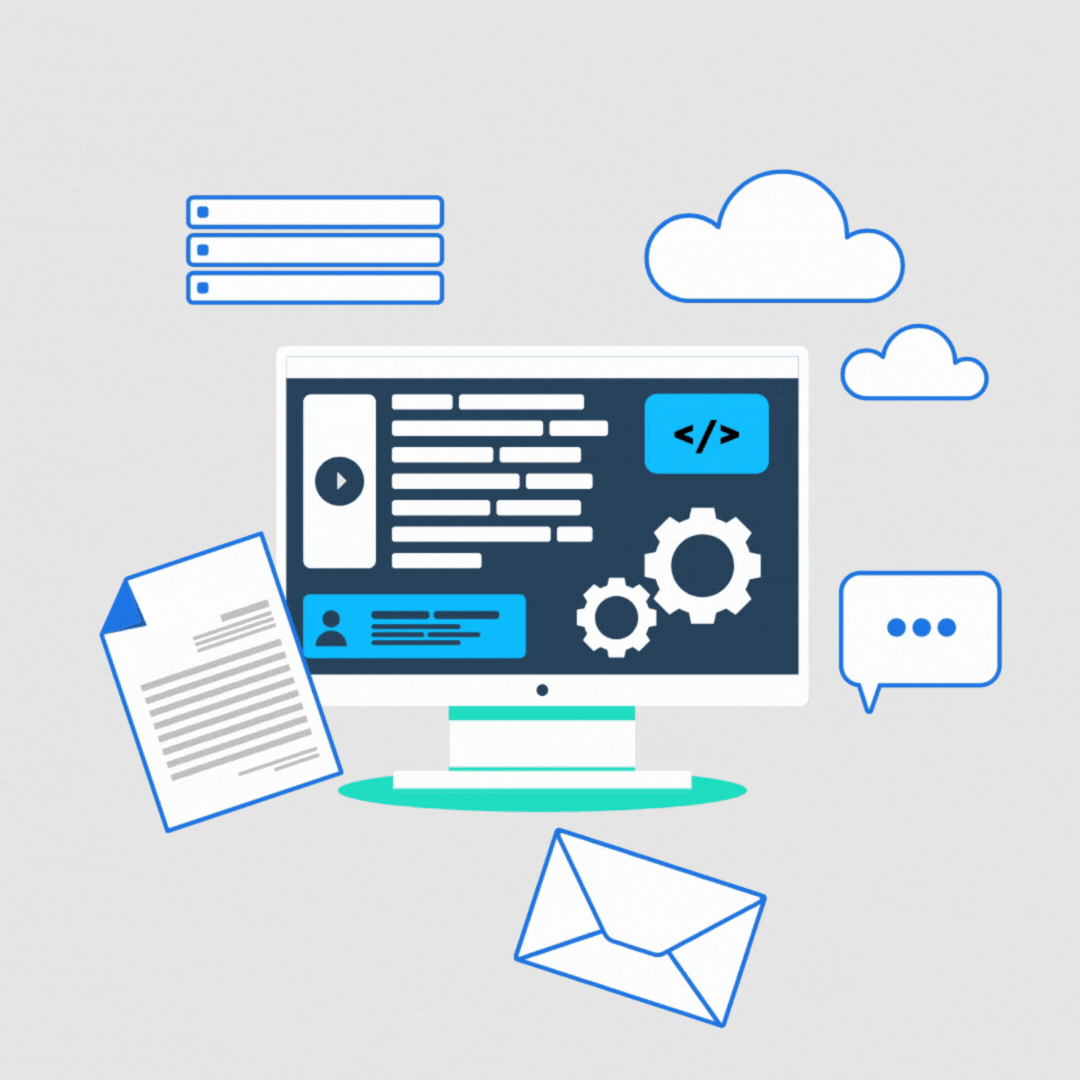
In the rapidly evolving landscape of technology, software development has become an indispensable force driving innovation and efficiency across various sectors. Let’s delve into how software development plays a pivotal role in transforming and enhancing key industries.
In today’s dynamic world, software development plays a crucial role. Various industries demand modern technology and software updates. This article will explore several instances where software development is imperative, examining how it contributes to the progress of different fields.
Software development has revolutionized healthcare, enabling EHR systems, telemedicine platforms, and diagnostic tools. These solutions streamline tasks and enhance communication among professionals, contributing to improved patient care.
In the finance industry, software development is crucial for creating robust banking applications, trading platforms, and financial management tools. The automation of processes and secure transaction handling are key elements driving efficiency in financial operations. Additionally, the implementation of advanced algorithms for risk assessment enhances security.
Features such as mobile check deposits, fund transfers, and real-time account monitoring have become commonplace, providing unparalleled convenience to customers.
Financial markets operate at lightning speed, and software development has enabled the creation of advanced trading platforms and algorithmic trading systems.
Budgeting apps, expense trackers, and financial planning software enable individuals and organizations to gain better control over their finances, plan for the future, and make informed financial decisions.
Blockchain ensures secure and transparent transactions, reducing fraud and enhancing the integrity of financial processes. Cryptocurrencies, powered by blockchain, have introduced decentralized and efficient alternatives to traditional currency systems.
These tools help organizations monitor and adhere to regulatory guidelines, mitigate risks, and ensure transparency in financial operations.
As the finance sector continues to embrace technological advancements, the role of software development will remain central to its evolution, fostering efficiency, security, and a more inclusive financial landscape.
Software solutions in agriculture, such as precision farming applications and data analytics tools, empower farmers to make informed decisions about crop management, resource allocation, and yield optimization. This technology ensures sustainable agricultural practices by maximizing output while minimizing environmental impact.
Software applications tailored for agriculture play a crucial role in crop management and monitoring. These applications assist farmers in tracking crop growth, detecting diseases, and managing irrigation schedules. With real-time data and analytics, farmers can make timely interventions, ensuring the health and quality of their crops. This proactive approach helps in reducing crop losses and maximizing yields.
Along with crop management and monitoring, another significant way in which software development has influenced agriculture is through precision farming. Advanced software solutions, often integrated with GPS technology and sensors, enable farmers to analyze and interpret data related to soil health, weather patterns, and crop performance. This data-driven approach allows for more informed decision-making, optimizing resource usage, and minimizing environmental impact.
Software development has transformed the sports and fitness industry, offering athletes, coaches, and enthusiasts tools for performance analysis, training management, and injury prevention. Wearable devices, fitness apps, and virtual training programs enable personalized fitness routines, while sports analytics contribute to strategic decision-making in professional sports, enhancing team performance. Some examples of times software development has provided assistance to athletes and those involved in fitness are as follows:
Athletes now utilize wearable devices equipped with sensors to monitor various metrics such as heart rate, distance covered, speed, and even biometric data. Software applications analyze this data, providing coaches and athletes with insights into performance, recovery, and injury prevention.
Software developers have created VR and AR applications that offer immersive training experiences. Athletes can simulate game scenarios, analyze opponents’ strategies, and enhance their decision-making skills in a controlled and realistic virtual environment.
Software applications help athletes and fitness enthusiasts create personalized nutrition plans based on their individual needs, goals, and dietary preferences. These apps often incorporate machine learning algorithms to refine recommendations over time.
From smart basketballs to sensor-laden soccer balls, sports equipment has become intelligent. These devices collect data on performance metrics such as ball speed, trajectory, and accuracy, providing valuable insights for both training and competition.
The rise of e-sports has been facilitated by software development, enabling competitive gaming on a global scale. E-sports platforms, streaming services, and online gaming communities have thrived due to sophisticated software solutions.
The entertainment industry heavily relies on software development for content creation, distribution, and consumption. Video streaming platforms, gaming apps, and virtual reality experiences are all products of software innovation. Content recommendation algorithms and digital marketing strategies driven by software contribute to personalized user experiences, enhancing engagement and entertainment value.
One of the most significant changes is evident in the realm of filmmaking, where advanced software tools have streamlined the production process. From computer-generated imagery (CGI) and special effects to sophisticated editing software, filmmakers now have a wide array of digital tools at their disposal. This has not only elevated the visual quality of films but has also expanded the creative possibilities, enabling directors to bring fantastical worlds to life and immerse audiences in visually stunning cinematic experiences.

Moreover, the rise of streaming services and digital platforms owes much to software development. Content delivery has become seamless and personalized, with algorithms analyzing user preferences to recommend tailored content. Subscription-based models, enabled by sophisticated billing and payment systems, have reshaped the traditional distribution model. Additionally, interactive entertainment experiences, such as virtual reality (VR) and augmented reality (AR) applications, have been made possible through innovative software development, offering audiences new ways to engage with content. Overall, software development has not only modernized traditional entertainment mediums but has also paved the way for entirely new forms of storytelling and audience engagement.
Nonprofit organizations leverage software development to streamline operations, manage donor relationships, and improve outreach efforts. Customized databases and CRM systems help nonprofits track donations, monitor program effectiveness, and communicate impact to stakeholders. Online fundraising platforms and social media integration further extend their reach and support.
The nonprofit and charitable sector has experienced a transformative shift with the integration of software development, significantly enhancing the ways organizations operate, fundraise, and engage with their communities. One notable development in the realm of charitable giving is the emergence of online crowdfunding platforms, with GoFundMe leading the charge. GoFundMe has revolutionized the nonprofit landscape by providing individuals and organizations with a user-friendly platform to create fundraising campaigns for various causes.
GoFundMe’s impact on the nonprofit industry is profound, as it democratizes fundraising, allowing individuals to directly support causes that resonate with them. Through compelling storytelling, multimedia content, and social media integration, campaigns gain visibility and reach a broader audience, transcending geographical boundaries. This platform has not only empowered grassroots initiatives but has also facilitated rapid response to emergencies and crises, showcasing the agility and responsiveness that technology can bring to philanthropy.
Beyond crowdfunding, software development has played a crucial role in optimizing the operational efficiency of nonprofits. Customer Relationship Management (CRM) systems tailored for nonprofits help organizations manage donor relationships, track contributions, and analyze donor engagement data. These tools enable nonprofits to tailor their communication strategies, fostering deeper connections with supporters and enhancing the overall donor experience.
Furthermore, software solutions have streamlined the administrative aspects of nonprofit work. Project management tools, collaborative platforms, and cloud-based solutions have simplified internal processes, allowing nonprofit teams to focus more on their mission-driven activities. Online fundraising platforms, apart from GoFundMe, offer features like recurring donations, event management, and donor segmentation, providing nonprofits with a robust suite of tools to diversify and sustain their funding sources.
Efficient supply chain management is critical in the logistics industry, and software development plays a key role in optimizing processes. Inventory management systems, route optimization algorithms, and real-time tracking solutions enhance visibility, reduce costs, and improve overall efficiency. Automation in warehouses and distribution centers is another area where software development contributes to operational excellence. There are three essential steps to logistics, from packaging to transportation and delivery. Each aspect has been positively impacted by software development technology.
Smart Packaging Solutions: Software-driven technologies such as RFID (Radio-Frequency Identification) and IoT (Internet of Things) have transformed packaging. RFID tags and sensors provide real-time visibility into the location and condition of goods, allowing for improved traceability and accountability during the packaging phase. This ensures that products are correctly labeled, packaged, and ready for the next stages of the logistics process.
Fleet Management Systems: Software development has given rise to fleet management systems that enable logistics companies to monitor and control their vehicle fleets in real-time. GPS tracking, predictive maintenance algorithms, and performance analytics help optimize vehicle usage, reduce downtime, and ensure that the transportation process is both reliable and cost-effective.
Last-Mile Delivery Solutions: The final leg of the logistics process, known as last-mile delivery, has been greatly influenced by software development. Delivery route optimization, real-time tracking, and delivery management platforms have enhanced the efficiency of last-mile operations. Mobile apps and notifications keep customers informed about the status of their deliveries, providing transparency and improving the overall customer experience.
In the retail sector, software development powers e-commerce platforms, inventory management systems, and customer relationship management tools. Online and brick-and-mortar retailers alike use software solutions to analyze consumer behavior, personalize shopping experiences, and optimize pricing strategies. Point-of-sale systems and mobile payment apps further enhance the overall retail experience.
E-commerce Platforms: The rise of online shopping has been driven by e-commerce platforms that leverage robust software development. These platforms provide a user-friendly interface for customers to browse, select, and purchase products from the comfort of their homes. Integration with secure payment gateways ensures smooth transactions, contributing to a positive online shopping experience.
Point of Sale (POS) Systems: Modern POS systems are powerful software applications that facilitate real-time inventory tracking, sales monitoring, and order processing. These systems automate many manual tasks, reducing errors and providing retailers with accurate insights into their stock levels. This ensures that products are consistently available, minimizing the risk of stockouts or overstock situations.
Customer Relationship Management (CRM): CRM systems enable retailers to collect and analyze customer data, helping them understand shopping patterns, preferences, and behavior. This information is crucial for personalized marketing campaigns, loyalty programs, and targeted promotions, enhancing customer engagement and satisfaction.
In conclusion, software development is a driving force behind innovation and efficiency in various industries, shaping the way we live and work. From enhancing healthcare delivery to revolutionizing finance, agriculture, sports, entertainment, nonprofits, logistics, and retail, the impact of software development is both diverse and profound. As technology continues to advance, the collaboration between industries and the software development community will undoubtedly lead to even more transformative solutions, pushing the boundaries of what is possible in our interconnected world.
Understanding the intricacies of these sectors is crucial when assessing the impact of software development in today’s world. Devdefy boasts a diverse portfolio, continually venturing into emerging industries. Selecting the appropriate team is essential for delving into the software potentials within your professional domain, propelling your company beyond anticipated boundaries.
